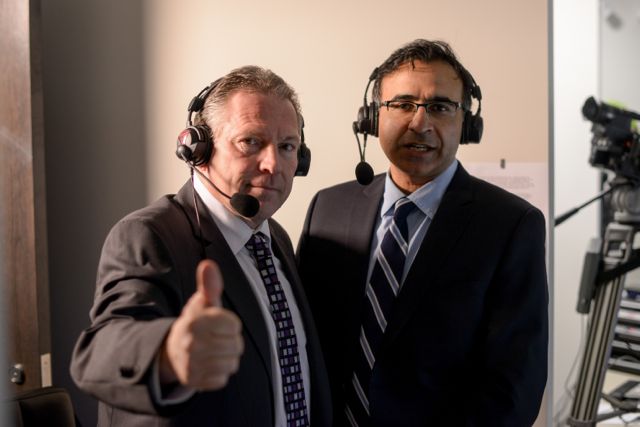"Bluelines: Summer Edition" is written by Ranjan Rupal (right), the play-by-play voice, and Greg Theberge (left), a former Memorial Cup winner and Washington Capitals defenseman and hockey analyst for The OHL Tonight on TVCogeco. Photo by Lindsay Sarazin.
They were my surrogate team.
I hadn’t grown up in North Bay and so never developed the kind of visceral dislike for them that my buddy Mike had, but when the Centennials bolted for Saginaw it seemed like the obvious choice to me. Sudbury Arena was just 90 minutes away, and puck drops were Friday at 7:30pm, which was perfect for us…Mike and I would get off work at five, Greg would meet us outside, and Randy would pick the three of us up in his Pontiac minivan.
On one such occasion we cruised west along Highway 17, in the darkness of a Friday night in early December, wet snow melting on the windshield. We were four grown men engaged in lively banter on a number of usual topics: the Leafs, the Habs, the Bruins, but on this night also a new topic: the inexplicable NHL lockout, and the approaching doomsday scenario of no season at all. And when our vim for these had petered out, we reminisced about the dearly departed Centennials, and also about the validity of a feral Federal Hockey League, and their obscure plans to locate in North Bay under the watchful eye of some mysterious Czech coach, perhaps from the old Communist bloc, who may have visited the city...maybe.
.gif) On this night, the Sudbury Wolves were hosting the Brampton Battalion, and I remember it because no sooner had we found our seats than Luke Lynes opened the scoring, 16 seconds in, to give the audacious olive-green invading force an early 1-0 lead. I recall my buddies, and those around us, openly ridiculing the Battalion’s jerseys, though I suspect this was because they feared their big night out was going bust.
On this night, the Sudbury Wolves were hosting the Brampton Battalion, and I remember it because no sooner had we found our seats than Luke Lynes opened the scoring, 16 seconds in, to give the audacious olive-green invading force an early 1-0 lead. I recall my buddies, and those around us, openly ridiculing the Battalion’s jerseys, though I suspect this was because they feared their big night out was going bust.
I enjoyed the lofty, bowl-shaped Sudbury Arena…and still do. I like its cozy confines, and the warm camaraderie of sitting and standing and cheering, shoulder-to-shoulder with hockey people, the kind found only in the north, and, as an outsider, the feeling of having slipped undetected into the Wolves’ lair so that, for one evening, I became immersed in the gravy of an immensely satisfying, richly authentic, Franco-Ontarian tradition. As I finished a well-appointed hot dog and washed it down with ice cold beer, I gazed through the haze that often forms in that building, above the brightly lit white ice, and I imagined husbands named Pierre, in fedoras and wool topcoats, and well-dressed wives named Marianne, wrapped in fur stoles, hair done up pretty for a night out, and that nothing had changed since 1951.
By the second period, I recall Wojtek Wolski being pretty darned good for the Battalion, but being biased I concluded he wasn’t quite as good as the Wolves’ Benoit Pouliot, and he certainly didn’t possess the raw vigor of a Zach Stortini, and I suspect these notions arose mainly because Luch Aquino had given the Battalion a 2-1 lead.
But midway through the third period the Arena erupted, putting to good use the beer guzzled at The Townehouse during intermission. In a span of 18 seconds, the Wolves had tied the game and, on a goal by Pouliot, taken the lead. When the Arena gets rockin’ on a Friday night, it can sound like the Bell Centre, and it did, and we drove home happy, but not before stopping at Deluxe Hamburgers for a chicken-on-a-bun, of course.
These days, from what I’m seeing, Sudbury Arena will rock again.
The new wolf pack is hungry. Having weathered the worst of a 2014-15 season that plunged the organization into the depths of chaos, they return reinvigorated, and hopeful, with a new coach and, with a budding young superstar of David Levin’s calibre, a decent chance to climb out of the Eastern Conference cellar and into the playoffs. Beyond Levin, who was selected first overall in the 2015 OHL Priority Selection, the Wolves' roster boasts four first round picks from three previous years, including Kyle Capobianco and Matt Schmalz, who were recently chosen at the NHL Draft.
To learn more about the new optimism in the Nickel City, I spoke with Dave Matsos, formerly the interim coach, now sworn in as the new head coach of the Sudbury Wolves…
Ranjan: Dave, you’re originally from Burlington, Ontario. But you played junior in Sault Ste. Marie, and now you’re coaching the Sudbury Wolves. What keeps bringing you back to the north country?
Dave Matsos: Obviously, the opportunity is one thing. Sudbury gave me an opportunity and a promotion, but based on my experience in the Soo, and now here, in my third year, I love the pace of life, and the passion you have with hockey. Here, we don’t compete in a sports market with any other professional sports. Windsor was a border town; we were competing with the Detroit Red Wings, the Tigers, the Lions, and the Pistons. And here, you’re the big thing in town, and I think it’s really neat for these kids to grow up as junior players in an environment where they’re recognized in the community for all the right reasons.
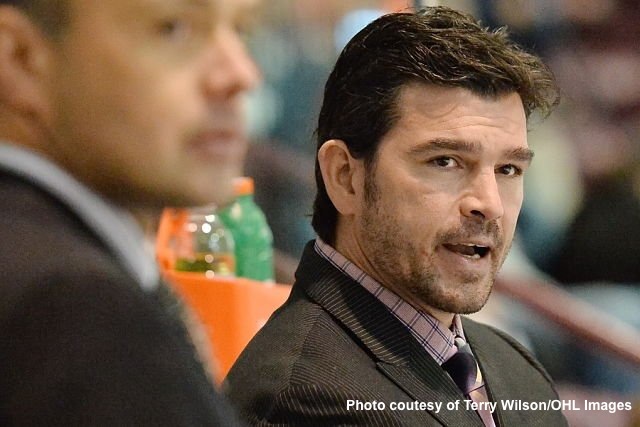
New head coach Dave Matsos (right) is tasked with reviving the Sudbury Wolves
Ranjan: As a former Soo Greyhound, you know how important hockey was, and is, to towns like North Bay. What do you recall from your visits to Memorial Gardens as a player?
Dave Matsos: I remember loving being in the OHL. I remember loving hanging out with my teammates; I remember the long bus trips. There were some nights where the nerves were kicking, because North Bay, Sudbury and the Soo, they were all tough teams, so you knew you were always going into a battle, but that was the fun of it. They were just hard games to play in. They were physical, there was fighting. The anxiety was almost welcome, because you knew you were in a position that every sportsman wanted to be in. I remember the intensity, and the nerves, and the quietness in the room after warm-up, before the first period. It was fun.
Ranjan: After two full seasons, the expected rivalry between Sudbury and North Bay hasn’t taken off quite yet. What needs to happen?
Dave Matsos: I thought year one we had some pretty good battles, to be honest. We were both fighting for top spot in the division. The games were always close. I’m sure over time it’s going to evolve. I believe that. We’re too close not to, and we play each other enough. Stan (Butler) has always got the big, hard-nosed teams, and we’re trying to build in that direction as well. I think over time it’s all going to play out nicely for the fans. Anyone from North Bay or Sudbury would welcome a playoff series between us.
Ranjan: You were a player-coach with the Cardiff Devils in Britain’s EIHL before becoming the head coach of the Sheffield Steelers. How did your experience in Britain shape your coaching philosophy?
Dave Matsos: Well, I don’t think anyone can prepare himself or herself for going from a player to being a coach. You know, these players think it’s exhausting being players, but honestly, I’ve never been more exhausted than after coaching a season. You bring it home; you have to think about what went right and what went wrong, and how can we fix it. It’s constantly on you. But the best thing about Britain, for me, was they believe in having one head coach on the bench and then a player-assistant, which is what I was when I was in Cardiff. So you learn that if you’re not extremely organized, and extremely on the ball in every aspect, if you fall a day behind, then it’s going to take you seven days to catch up. And you learn that very quickly: it’s time management, it’s being able to coach the team system-wise, and breaking down the video, and in charge of recruiting players. I was responsible for so much more than over here, where the hockey staff is a lot bigger. It allowed me to organize myself - over-organize is a good word for it - and develop a relentless work ethic. I’m sure every coach that works over there comes off the same. Your work ethic has to be off the charts.
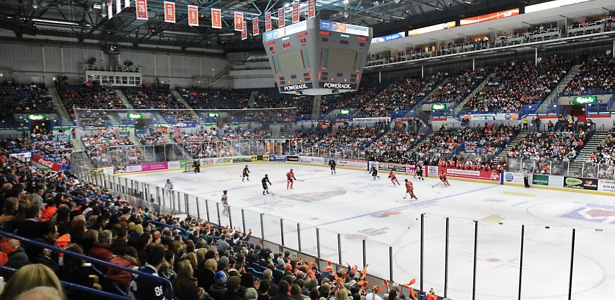
Matsos' first coaching position was in Britain with the Sheffield Steelers
Ranjan: A quick Sheffield question…Wednesday or United?
Dave Matsos: [laughs] Man City...and I'll explain why... It’s funny, because we ended up catching a lot of football matches while we were over there. I signed a kid named Mark Thomas, and his grandfather was the president of Manchester City. We didn’t realize how spoiled we were, but we used to go down to the Man City games, right into the president’s suite, where there was so much unbelievable food. It was royal treatment. It was insane, actually. And then afterwards he would take us down to the room and we could mingle with the players. He would take us out to the field; they would call it the pitch. All of us became very fond of Man City because we got to know the players personally. It was wild. I don’t think a lot of the Canadians realized how lucky we were to come face to face with some of these footballers. But we had a key to the president’s suite and they treated us royally.
Ranjan: Today you’re viewed as a player’s coach. What does that label mean?
Dave Matsos: I like to know my players. It’s really important nowadays that there’s an open line of communication. There’s no fear for knocking on the door, for any reason whatsoever, whether its off-ice issues or on-ice, with ice time or whatever else. I think that if you can win your players over, and you don’t have to work at winning them over, it’s just paying attention to them, and knowing that your players know that you care about them, then these boys will move mountains for you, and you’ll be able to squeeze them for every ounce they can offer you, rather than going the other way and having the boys underachieve. It’s a goal to have these boys over achieve.
Ranjan: You have 5 seasons as an assistant coach in the OHL, starting with the Windsor Spitfires, a team that has struggled to rebuild, saddled by the crushing weight of League-imposed sanctions, following back-to-back Memorial Cups in 2009 and 2010. What did you learn in Windsor?
Dave Matsos: Bob Boughner, Bob Jones and D.J. Smith are intelligent. They’re on it, no doubt about it. Technically I learned a lot, I learned a lot system-wise. They work hard. They work long hours. You look at the position that I’m in, and you look at the position that D.J. was in, and now has been promoted to...this Windsor team is not just pumping out hockey players into the NHL Draft, they’re molding and grooming coaches and good people.
Ranjan: Last season the Wolves were dismal. You were there when Paul Fixter lost his job and, after taking over, a month goes by before you earn your first win, finishing up 5-29-0-0. Under these trying circumstances, what was your plan?
Dave Matsos: We were a team that was broken, in the sense that our confidence was low. It was up to me to keep the environment as positive as possible. At the end of the day, my goal was to give our team a chance to win every single night. The hard thing about it was we were playing for nothing, and we were playing for nothing really early. It wasn’t easy, but looking back on it now, these guys never stopped competing for me. And that’s a big thing. There’s no better way to explain it. On a lot of nights we were going to get out-skilled by teams that were adding pieces, or loaded with NHL draft picks, but we weren’t getting outworked. And for me, that was a big one.
Sudbury Wolves Historical Record: 2012 - 2015
| Year | Conf | Team | GP | W | L | OTL | SOL | GF | GA | PTS | Finish |
|---|---|---|---|---|---|---|---|---|---|---|---|
| 2014-15 | 10th | Sudbury | 68 | 12 | 54 | 1 | 1 | 2.2 | 4.75 | 26 | DNQ |
| 2013-14 | 5th | Sudbury | 68 | 33 | 24 | 3 | 8 | 3.2 | 3.35 | 77 | 1st Rd |
| 2012-13 | 5th | Sudbury | 68 | 29 | 27 | 5 | 7 | 3.1 | 3.44 | 70 | 2nd Rd |
Ranjan: It’s not often the coach is scrutinized more heavily than the players. But in Sudbury, come September, all eyes will be on you. Is that fair?
Dave Matsos: Well...I accept it. Whether it’s fair or not? People are going to form their own opinions. I’m very comfortable with who I am and how I coach...and my players are very comfortable with me. Taking a job like this, you sign up for criticism, or you sign up for reward, and I take both equally. My head doesn’t swell when things are going great, and believe me, in this industry you learn to form thick skin to take the criticism. You know, when I was overseas and I took over as a head coach, I didn’t stray from my beliefs. There were times when things were pretty dark, and you’re battling with your confidence. But if you have a plan, if you have a vision, under any circumstances you stay with it. And I’m comfortable in my beliefs of what it takes to win...I’ve been on that side.
In Sheffield, before you know it, we took an eighth place team to winning back-to-back-to-back championships, always sticking with the vision and, believe me, my first year there as a young coach I was getting crucified by the papers, and then, the same group of guys, by the second season, there were trophies all over Sheffield. I don’t expect next year to be all rosy, but I’m going to build a picket fence around these players and they’re going to stay shoulder-to-shoulder on this, and before long you’re going to see a team that’s right back in the thick of it.
Ranjan: February 11, 2015. Sudbury beats North Bay 3-2 at the Arena. Three 3rd-period goals, led by Kyle Capobianco with a goal and an assist, and Troy Timpano stops 41 shots. Was that game a demonstration of things to come?
Dave Matsos: That was our team getting to know each other. What happened when Paul was released was… it was a Friday night, and we played Oshawa, a pretty good team, and we played Sunday against North Bay, in North Bay, another pretty good team. We had midweek games for, I think, the first four weeks that I was handed the job. We had very little practice time, and there were more maintenance days than I really wanted. But in fairness to our guys, it wasn’t September, where I could afford to keep them on the ice. We were battling with fatigue and injuries and everything else. We weren’t in a comfortable position to run our system practices. We weren’t comfortable to get to know each other in practice and I think that worked against us.
By the time February came around, we had spent enough time together, video-wise, and system-wise, that the players and I started feeling very comfortable with each other. I think, down the stretch there, we were competing every night. There were more one-goal defeats; we were in more games. Some games we deserved to win, by outshooting and out-chancing teams, it was post-and-out rather than post-and-in. I think the players, after they left for the season, are excited about coming back here, because of the way things finished.
Ranjan: The Import draft has produced some exciting players for Sudbury in the past, like Pavel Jenys and Dominik Kubalik, but around the League lately, a number of disappointments as well. What’s the secret to landing the next Nail Yakupov?
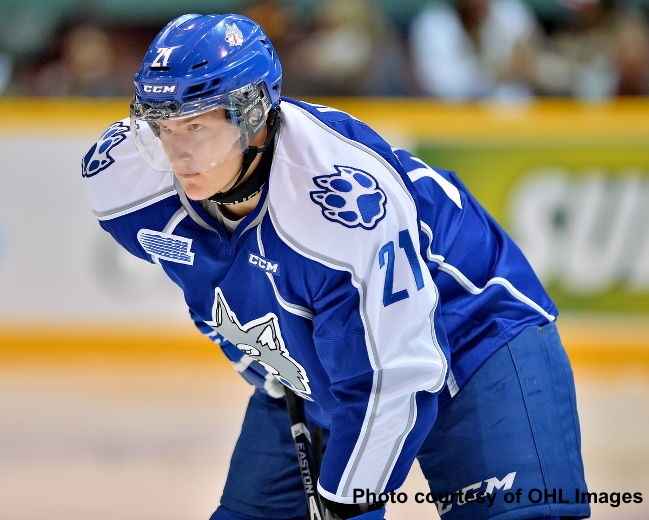
Minnesota Wild prospect Pavel Jenys led the Wolves in scoring
Dave Matsos: I think, like anything, it’s just doing your homework. The problem nowadays is these exceptional players, unless they’re being told by NHL teams to come over and play in the OHL, they’re making professional money in the European leagues. In junior here, the reward is that you’re being scouted every single night that you play. You’re in the eyes of the NHL all the time. So if your aspirations are to get to the NHL, then it’s probably a good League to come over for. But, a lot of these guys are being paid, as 17 and 18 year olds, to play pro over there and, as a result, it’s hard to get some of the top pedigree to come over.
Ranjan: Describe the importance of Pavel Jenys to your plans for 2015-16?
Dave Matsos: He’s a huge part. He’s got such a high compete level; anyone in our League can see that. He’s obviously raising eyebrows at the National League level too: the Minnesota Wild drafted him and they’ve now signed him. He’s a big presence for us, terrific kid off the ice, a good teammate. He didn’t have up-and-down games; he was always doing something, whether it was hitting, or contributing physically. Some games you would have trouble getting the puck of his stick, so he brought something to our team every single night. He’s a 19-year old, and it took him a bit of time to figure this team out, like it did for most guys. But I expect him to come back, with full confidence next year, and if not our best player, definitely one of our top three.
Ranjan: Your team was very young last year, so the question of OA’s for the upcoming season raises some interesting questions. What are you looking for out of your OA’s this season?
Dave Matsos: We struggled last year to score. I think our OA’s being 20-year olds have to be accountable for that. But on the other side too, you want to have good people in your room. You want to have OA’s that are going to teach and walk your young guys through the season and teach them how to be junior-A players, teaching them also how to behave, and how to treat people away from the rink. I think that’s really important. You don’t want someone who lives life recklessly off the ice, or who makes bad decisions or selfish plays on the ice. You want your young guys to see a model citizen in your ’95’s.
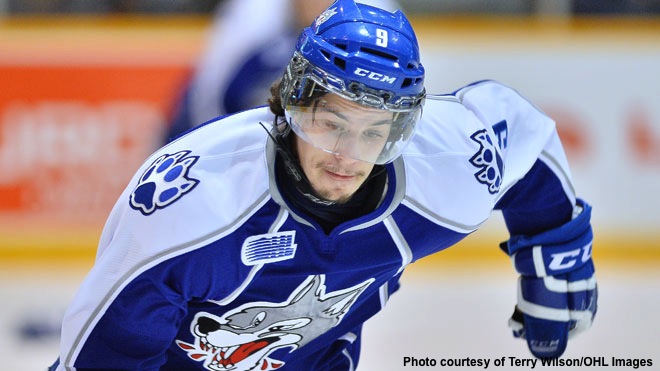
Overager Danny Desrochers has become a role model for young Wolves to follow
Ranjan: Describe the role of a player like Danny Desrochers, a North Bay-native who led the Trappers earlier in his career, and how he factors in what you’re trying to do this year?
Dave Matsos: Danny is exactly the guy that I’m talking about. Danny Desrochers practices at one pace, and that’s top speed. He plays the game at top speed, and he plays the game with so much passion. I think that he’s a perfect role model for our young guys. He takes care of himself off the ice; he takes care of his teammates. He’s respectful to billets, and fans, and everybody, and that’s exactly what I’m preaching. It comes natural to him, he doesn’t have to work at it, and he’s a good guy to have our young guys mold themselves after in a lot of ways.
Ranjan: Another North Bay-born player, Michael Silveri, earned some playing time on the big club last year. He’s a big body out there…what does Michael have to do to earn a roster spot?
Dave Matsos: I think he’s got to carry the confidence that he had in the playoffs with Powassan last year into training camp, and he’ll have every chance to make this team. Yes, he’s a big body, and he’s a good kid, he’s easy to coach…he’s very coachable. He really elevated his game in the playoffs, and if he comes into camp in good shape, which I know he will, and just plays with that sort of confidence, he’s going build a real good case.
Ranjan: Again this season, a very young blueline, and without Jeff Corbett back there, the soon-to-be-drafted Kyle Capobianco, and Jonathan Duchesne, must lead the way. Describe the challenge that lies ahead…
Dave Matsos: Those guys might be minute-muchers, along with Conor Cummins. But I think collectively as a group the D-corps is going to have to commit to playing a very simplified, very basic game. We don’t need our D leading the rush, we want them to hand pucks to our forwards and join the rush. I like our balance between lefties and righties. I like our size back there. We’ve got a lot of guys who are least 6-feet; Clapham, Bourque, Duche and Capo, they’re all 6, or 6’-1”. Conor Cummins is 6’-2-½” but I think when you have a young D-corps like we do, simple is better... [laughs] apart from Capo…
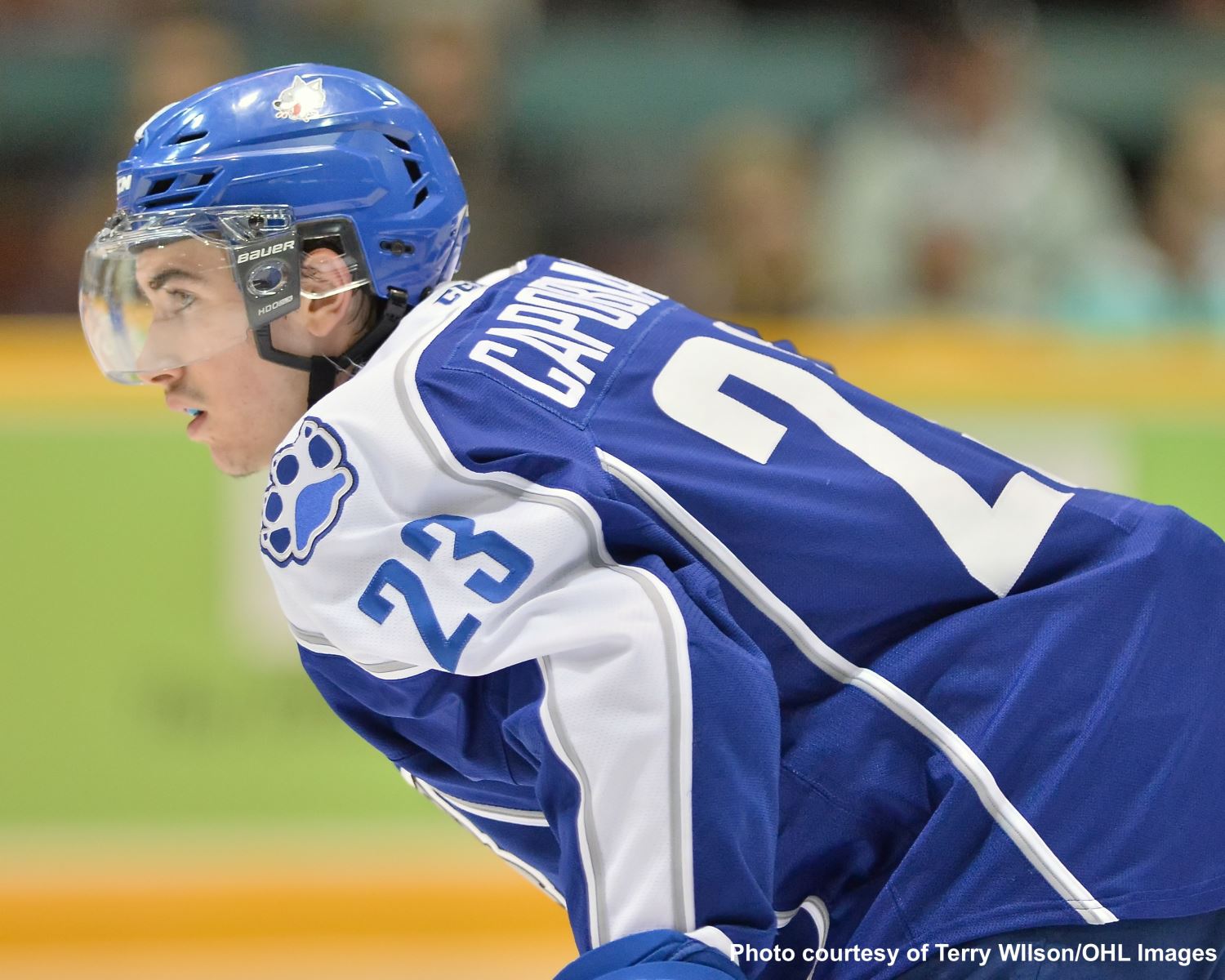
Kyle Capobianco was chosen by Arizona in the 3rd round of the 2015 NHL Draft
Ranjan: Dave, your job was tough, but surely your goalie Troy Timpano had the toughest job in the League last year. Describe what you saw from him…
Dave Matsos: Troy is such a competitive guy. He wanted the net. I think that Troy realized that down the stretch he ended up with a bit of an injury, and he took 4 or 5 games off, a week and a half that he wasn’t accustomed to, and he came back completely rejuvenated.
I think Troy and I realized that goalies are human and the workload has to be shared. He’s our number one, no doubt about it, and he will carry most of our workload, no doubt about it. He needs to rest up, and he needs his body to rest as well, for him to be at his best. He basically took a year off the year before, because Franky Palazzese played most of the games. There was a little bit of rust there.
.jpg)
Troy Timpano holds his ground in busy traffic
But we were giving up, as a team, over 22 scoring chances, on average, 22.61, in the first 34 games. It wasn’t immediate because we played, like I said, Oshawa and North Bay, Barrie and Niagara…I mean…we were playing some good teams before I had a chance to break this down and remold it. But by the end of it, we brought it down to 16 scoring chances against. We were giving up 6½ fewer scoring chances per game in that Grade-A scoring area than we were for the first 34 games. We altered systems; our D-zone structure changed, and our commitment to playing defense: we emphasized that more than ever. We worked on that 30 minutes every single day, the whole second half. Every single day. We did D-zone coverage, even the day before games…half an hour. And those are the kinds of things that excite me going forward. But we’re going to have to fight hard for every single point again next year.
Ranjan: It’s not too often that a team gets the 1st overall pick in the Priority Selection. Tell me about David Levin.
Dave Matsos: I went down to the OHL Gold Cup and watched him play there. The thing I like about Dave Levin is he’s highly skilled but he also likes to play in the hard areas. I think that’s a hard mix to find. He’s not a perimeter player. I think the best thing about David Levin is how much potential does this guy have, with respect to how little he’s actually been on skates. Three years of hockey, and he went number one overall. That’s special. The exciting thing is we get him as a 16-year old, and how fun it’s going to be to watch this kid evolve into a 19-year old, watching this kid develop in practice everyday, competing against guys who are bigger, stronger, older and see how spectacular this kid can end up being.
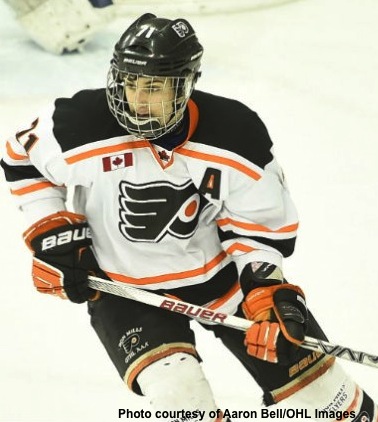
First pick overall, a young David Levin adds a much-needed scoring threat
Ranjan: Does Levin become a personal project for you, or the job of the assistant coach?
Dave Matsos: I think every player has different needs. You have to pay attention to all of them but in different ways. Is he going to be a special case? No, he’s not. He’s going to be just like every other guy that we want to develop into a good hockey player who plays the right way, and a good person off the ice who makes the right decisions.
Ranjan: Last question. Give me your best sales pitch. Why should Battalion fans book the fan bus for Sudbury games this season?
Dave Matsos: [laughs] I think the North needs this rivalry. The more the fans get involved, the more blue shirts we see in North Bay, and the more North Bay shirts we see in Sudbury is only going to help create that rivalry.
